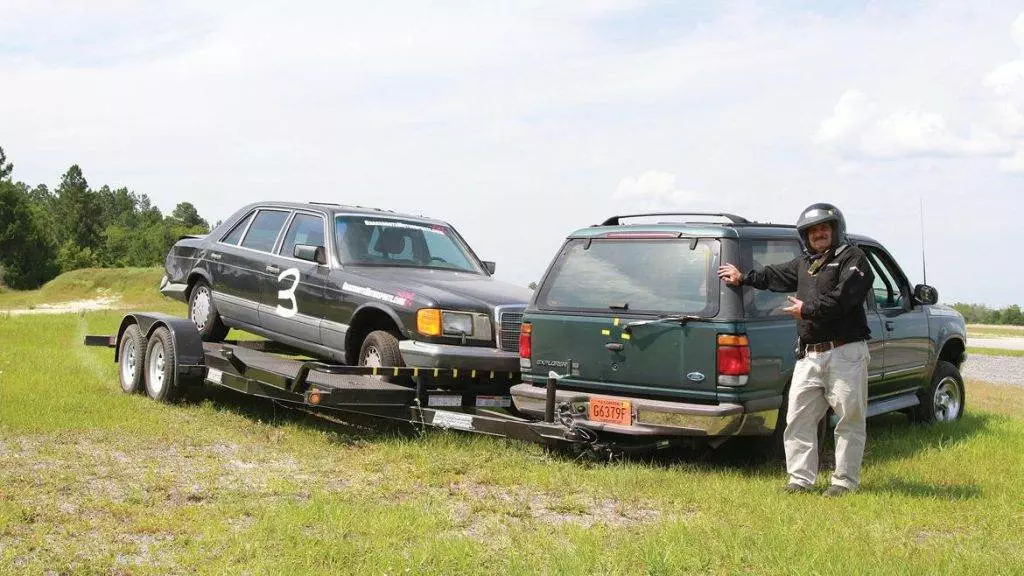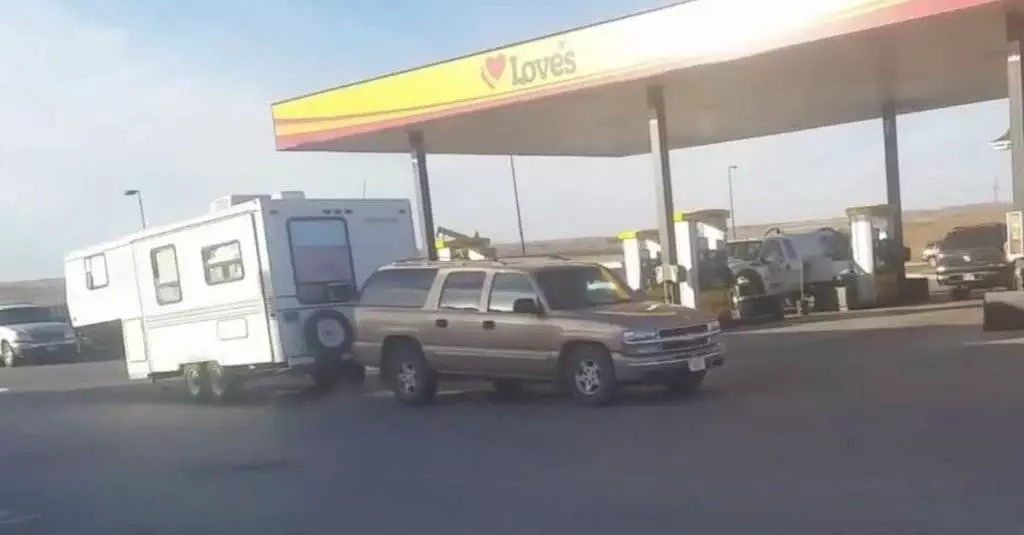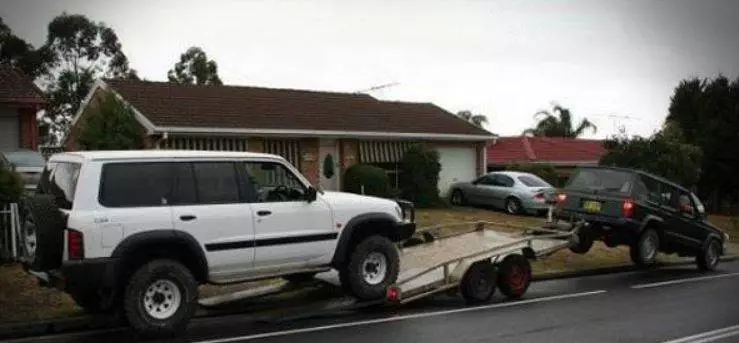Towing a vehicle can often prove to be an essential service in times of need, with the ability to rescue stranded vehicles or transport large items. However, like any other mechanical endeavor, there are a variety of complications that can arise during the towing process. From Unexpected vehicle damage to improper hitch installations, the world of towing is not entirely free from mishaps. In this article, we explore the pitfalls and potential complications that can arise when towing a vehicle, shedding light on all the things that can go wrong in this seemingly straightforward task. So, buckle up and join us on this journey through the potential pitfalls of towing.
Mechanical Issues
When it comes to towing, mechanical issues can be a major concern. Tire blowouts, brake failure, and engine overheating are just a few of the potential problems that can arise.
Tire Blowouts
One of the most common mechanical issues encountered while towing is tire blowouts. This can be a dangerous situation, especially when traveling at high speeds on the highway. Blowouts can occur due to various factors, such as overloading the trailer, inadequate tire pressure, or even worn-out tires. It is crucial to regularly inspect and maintain the tires on both the towing vehicle and the trailer to minimize the risk of blowouts.
Brake Failure
Brakes are vital for maintaining control and stopping power when towing. Unfortunately, brake failure is another mechanical issue that can occur. Whether it’s due to worn brake pads, malfunctioning brake systems, or Inadequate brake fluid, brake failure can lead to disastrous consequences. Regular brake inspections and proper maintenance are crucial to ensure the brakes are in optimal condition and to prevent brake failure while towing.
Engine Overheating
Towing places additional strain on the engine, which can lead to overheating. Extended periods of uphill driving, heavy loads, and inadequate cooling systems are some common causes of engine overheating while towing. It is essential to ensure the vehicle’s cooling system is in good working order and to monitor engine temperatures closely to avoid overheating. Regular maintenance, such as coolant flushes and radiator inspections, can help prevent engine overheating and potential damage to the towing vehicle.
Improper Loading and Weight Distribution
Proper loading and weight distribution of the trailer are critical for safe towing. Failure to do so can result in stability issues, reduced control, and potential accidents.
Overloading the Trailer
Overloading the trailer is a common mistake that can have serious consequences. Exceeding the maximum weight capacity of the trailer can put excessive strain on the towing vehicle, leading to mechanical failures, decreased maneuverability, and increased braking distances. It is vital to know the weight limits of both the trailer and the towing vehicle and to avoid overloading the trailer to ensure safe towing.
Uneven Weight Distribution
Proper weight distribution within the trailer is just as crucial as avoiding overloading. Uneven weight distribution can cause instability, increased swaying, and poor handling. It is essential to distribute the load evenly across the trailer, placing heavier items closer to the axle, and securing the load properly. This will help maintain stability and balance while towing, ensuring a safer and more controlled driving experience.
Improperly Securing the Load
In addition to proper weight distribution, securing the load is essential to prevent shifting or falling during transportation. Neglecting to secure the load properly can lead to accidents, damage to the towing vehicle, and endanger other road users. Using appropriate tie-down straps, chains, and cargo nets can help ensure the load remains secure throughout the journey. Regularly checking the security of the load during breaks and stops is also crucial to identify any potential issues and make necessary adjustments.

This image is property of s3.us-east-2.amazonaws.com.
Inadequate Towing Equipment
Using improper or faulty towing equipment can significantly increase the risks associated with towing. It is important to ensure that all towing equipment is in good working order and suitable for the specific towing requirements.
Malfunctioning Towing Hitch
The towing hitch is the connection point between the towing vehicle and the trailer, and its proper functioning is vital for safe towing. A malfunctioning hitch can lead to complete detachment of the trailer, loss of control, and potential accidents. Regular inspections, lubrication, and maintenance of the hitch are necessary to prevent malfunctions and ensure secure towing.
Insufficient Brake System
Having a reliable and efficient brake system is crucial while towing. Insufficient brake systems can result in longer braking distances, reduced stopping power, and increased risks of accidents. It is essential to ensure the brake system of the towing vehicle is capable of handling the additional weight of the trailer. Regular brake inspections, maintenance, and, if necessary, upgrading to a more robust braking system can help ensure safe towing.
Faulty Safety Chains
Safety chains are an essential part of towing equipment, providing an additional layer of security in the event of hitch failure. However, using faulty or inadequate safety chains can put both the towing vehicle and the trailer at risk. It is essential to inspect the safety chains regularly, ensuring they are in good condition, properly attached, and of appropriate strength to handle the weight being towed. Investing in quality safety chains and replacing them when necessary is crucial for safe and secure towing.
Lack of Proper Maintenance
Proper maintenance is crucial for any vehicle, but it becomes even more critical when it comes to towing. Neglecting regular maintenance tasks can lead to various issues that can compromise safety while towing.
Worn-out Tires
Tire maintenance is especially important when towing as tires endure increased stress and wear. Worn-out tires can affect traction, control, and stability, increasing the risks of accidents while towing. Regularly inspecting tire tread depth, air pressure, and overall condition is essential. Replacing tires when they are worn-out and maintaining proper tire inflation levels can help mitigate the risks associated with towing.
Inadequate Trailer Lighting
Proper trailer lighting is crucial for ensuring visibility and signaling intentions to other road users. Inadequate trailer lighting can make it difficult for others to see the towing vehicle and predict its movements, leading to accidents and collisions. Regularly inspecting and maintaining the trailer’s lighting system, including brake lights, turn signals, and taillights, is essential to ensure optimal visibility and compliance with traffic regulations.
Neglected Trailer Bearings
Trailer bearings are critical components that facilitate smooth movement and rotation of the trailer’s wheels. Neglecting to maintain and lubricate the trailer bearings can lead to excessive friction, overheating, and potential bearing failure. Regular inspections and greasing of the trailer bearings are necessary to ensure proper functionality and prevent unexpected breakdowns while towing.

This image is property of www.weigh-safe.com.
Inexperienced or Inattentive Drivers
The driver’s skills, knowledge, and attentiveness play a significant role in safe towing. Inexperienced or inattentive drivers face increased risks and can contribute to accidents and incidents on the road.
Lack of Knowledge in Towing Techniques
Towing requires specialized knowledge and skills to ensure safe operation. Inexperienced drivers may lack the necessary knowledge of towing techniques, such as proper braking, turning, and maneuvering with a trailer. It is essential for drivers to undergo proper training and familiarize themselves with towing best practices before attempting to tow a trailer. Understanding the limitations and characteristics of towing can help prevent accidents and enhance overall safety on the road.
Failure to Use Mirrors and Signals
Proper use of mirrors and signals is crucial for safe and effective towing. Inattentive or negligent drivers may fail to utilize their mirrors effectively, leading to blind spots and potential accidents. Additionally, failing to use appropriate signals when changing lanes, turning, or braking can confuse other drivers and increase the risks of collisions. Maintaining constant awareness of the surroundings, using mirrors effectively, and signaling intentions clearly are essential for safe towing.
Distracted Driving
Distracted driving continues to be a significant issue on the roads, and it becomes even more dangerous when towing. Distractions, such as mobile devices, eating, or adjusting electronic systems, divert the driver’s attention from the road and the trailer being towed. Taking eyes off the road, even for a moment, can lead to loss of control, accidents, and potentially severe consequences. Maintaining focus, avoiding distractions, and practicing attentive driving are essential for safe towing.
Weather and Road Conditions
External factors, such as weather and road conditions, can greatly impact the safety of towing. Being aware of these conditions and adapting driving techniques accordingly is crucial for safe towing.
Strong Winds
Strong winds can pose a significant risk to towing, especially for trailers with higher profiles. Crosswinds can cause trailers to sway, reducing stability and control. Drivers must be attentive to weather forecasts and adjust their driving techniques if strong winds are expected. Slowing down, maintaining a firm grip on the steering wheel, and avoiding sudden maneuvers can help mitigate the risks associated with strong winds.
Rain and Slippery Surfaces
Towing in wet conditions can be challenging and increase the risks of accidents. Rain can create slippery surfaces, reducing traction and making it more difficult to maintain control. It is important to adjust driving speed, increase following distances, and avoid sudden braking or accelerating in wet conditions. Ensuring proper tire tread depth and using suitable tires for wet surfaces can enhance safety while towing in the rain.
Uneven or Bumpy Roads
Uneven or bumpy roads can exacerbate stability issues when towing, leading to increased swaying and reduced control. Drivers must be cautious when encountering uneven or bumpy road surfaces, maintaining a steady speed, and avoiding sudden maneuvers. Ensuring proper weight distribution, secure load, and regularly inspecting the trailer’s suspension system can help minimize the effects of uneven or bumpy roads while towing.

This image is property of alhambratowingservice.info.
Reckless Driving by Others
Even the most skilled and cautious drivers can be at risk due to the reckless behavior of other drivers on the road. Reckless driving practices can create dangerous situations for towing vehicles and increase the chances of accidents.
Tailgating and Sudden Braking
Tailgating, or following too closely behind a towing vehicle, is a reckless driving behavior that can be especially dangerous. Sudden braking by the towing vehicle may not provide enough time for the driver behind to react, increasing the risks of rear-end collisions. Maintaining a safe following distance and being cautious of drivers who are tailgating can help mitigate the risks associated with this reckless driving behavior.
Unsafe Lane Changes
Unsafe lane changes by other drivers can pose a significant risk to towing vehicles. Abrupt lane changes without signaling or checking blind spots can lead to collisions or force the towing vehicle to take evasive maneuvers. Maintaining situational awareness, using mirrors effectively, and being prepared to react to sudden lane changes can help prevent accidents caused by the reckless behavior of other drivers.
Aggressive Driving
Aggressive driving, such as excessive speeding, weaving through traffic, or flashing headlights, can create hazardous situations for towing vehicles. Aggressive drivers may not consider the limitations and additional challenges faced by towing vehicles, increasing the risks of accidents. It is important for towing drivers to remain calm, avoid engaging with aggressive drivers, and focus on safe driving practices to navigate through traffic safely.
Damage to the Towed Vehicle
Towing can potentially cause damage to the vehicle being towed, especially if proper precautions are not taken. Scratches, dents, fluid leaks, and transmission damage are some of the risks associated with towing.
Scratches and Dents
Improper loading, securing, or maneuvering of the trailer can result in scratches and dents to the towed vehicle. Carelessly opening doors, hitting curbs, or misjudging turns can also cause damage. It is important to exercise caution and precision when loading, towing, and maneuvering to avoid scratching or denting the towed vehicle.
Fluid Leaks
The strain of towing can occasionally lead to fluid leaks from the towed vehicle. Overheating of the transmission or engine can cause fluid leaks, potentially resulting in damage and requiring costly repairs. Regularly monitoring fluid levels, maintaining proper cooling systems, and promptly addressing any leaks can help prevent damage to the towed vehicle.
Transmission Damage
Towing places additional strain on the transmission system of the towed vehicle. If the transmission is not capable of handling the added weight or if improper techniques are used, damage can occur. Maintaining the towed vehicle’s transmission system, ensuring it is appropriately rated for towing, and utilizing proper towing techniques can help prevent transmission damage.

This image is property of s3.us-east-2.amazonaws.com.
Accidents and Collisions
Despite taking all necessary precautions, accidents and collisions can still occur while towing. Understanding the potential risks and being prepared for potential accidents is crucial for safe towing.
Rear-End Collisions
Rear-end collisions are a common risk when towing, especially due to reduced braking distances and increased stopping times. Other drivers may not anticipate the reduced maneuverability of towing vehicles, leading to collisions. Maintaining a safe following distance, alerting other drivers with appropriate signals, and braking with ample time can help prevent rear-end collisions while towing.
Side Swipes
Side swipes occur when other vehicles negligently or recklessly change lanes without noticing the presence of a towing vehicle. The increased length and reduced visibility of towing vehicles can make them more vulnerable to side swipes. Maintaining situational awareness, using mirrors effectively, and avoiding blind spots can help minimize the risks of side swipes while towing.
Jackknifing
Jackknifing is a dangerous situation that occurs when the trailer swings out of control and angles towards the towing vehicle. Jackknifing can happen due to sudden braking, improper weight distribution, or inadequate control. Proper braking techniques, distributing weight evenly, and maintaining control during turns can help prevent jackknifing and its potentially disastrous consequences.
Legal and Insurance Issues
Towing without proper licensing and insufficient insurance coverage can lead to legal and insurance complications that can have severe consequences.
Lack of Proper Towing License
Driving while towing a trailer without the proper towing license can result in legal penalties and potential liability issues. It is essential to research and obtain the appropriate towing license for the specific towing vehicle and trailer being used. Complying with towing regulations and obtaining the necessary licenses can help avoid legal complications while towing.
Insufficient Insurance Coverage
Insufficient insurance coverage can leave towing vehicle owners vulnerable to financial risks in the event of accidents or damage. It is crucial to review insurance policies and ensure they adequately cover towing activities. Obtaining specialized insurance coverage for towing can provide peace of mind and financial protection in case of unforeseen incidents.
Violation of Towing Regulations
Towing regulations vary by jurisdiction, and violating these regulations can result in legal consequences and potential liability issues. Ignorance of towing regulations is not a valid defense, and drivers must take responsibility to familiarize themselves with and adhere to applicable towing regulations. Complying with regulations regarding weight limits, lighting requirements, and proper licensing is essential to avoid legal and insurance complications while towing.
In conclusion, towing can present various challenges and risks. Mechanical issues, improper loading, inadequate equipment, lack of maintenance, driver inexperience or inattentiveness, weather and road conditions, reckless driving by others, damage to the towed vehicle, accidents and collisions, as well as legal and insurance issues, are some of the factors that can go wrong with towing. By understanding these potential issues and taking appropriate precautions, towing can be done safely and efficiently, providing a reliable means of transporting goods and recreational vehicles.

This image is property of towingbeverlyhills.us.


